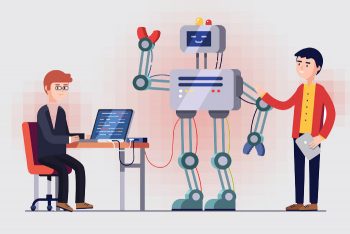
IBM (NYSE: IBM) introduced AI OpenScale, a new technology platform that addresses key challenges of artificial intelligence (AI) adoption, such as concerns over how AI applications make decisions, the global shortage of AI skills and the complexities of working with disparate AI tools from multiple vendors.
IBM’s new technology platform is the first of its kind. It will enable companies to manage AI transparently throughout the full AI lifecycle, irrespective of where their AI applications were built or in which environment they currently run. AI OpenScale can detect and address bias across the spectrum of AI applications, as those applications are being run.
As part of AI OpenScale, IBM also will debut NeuNetS, a major scientific breakthrough in which AI builds AI – making it possible to create complex, deep-neural networks from scratch. This will help address the AI skills gap and accelerate scaling AI.
“To accelerate AI adoption, businesses need one place to run all their AI,” said David Kenny, senior vice president, IBM Cognitive Solutions. “We are committed to enabling our clients to use the AI of their choice, regardless of vendor – and use IBM AI OpenScale to make it transparent and easy to manage. Only through enabling businesses to trust and scale their AI will we enable the AI economy.”
A recent study of 5,000 C-level executives by IBM shows that 82 percent of businesses surveyed are considering using artificial intelligence, but 63 percent lack the in-house talent to confidently manage the technology. Also, 60 percent are hindered by concerns over trust and compliance.
“AI is a significant enabler of business transformation and leaders need to demonstrate they trust and responsibly use AI. This includes an explanation of how AI capabilities are free of bias, protected from misuse, and consistently and predictably perform. For KPMG, it’s critical we have AI technology that helps facilitate trust among organizations, and strategically supports enterprise-wide transformation. IBM’s new AI OpenScale capabilities are designed to enable and enhance trust amongst organizations,” according to Vinodh Swaminathan, Principal in KPMG’s Innovation & Enterprise Solutions group.
The AI OpenScale Advantage
AI OpenScale automates explainability, mitigates bias and provides auditability throughout the lifecycle of AI in a vendor-agnostic way. It helps companies:
- Understand how AI applications reach decisions – AI OpenScale explains how AI recommendations are made in everyday business terms.
- Address bias in AI applications automatically – AI OpenScale continually monitors AI applications and prevents bias through a unique, powerful and automated de-biasing technology.
- Ensure AI applications are auditable – AI OpenScale logs every prediction, every model version, and all the training data used, together with all metrics to help businesses comply with regulations such as GDPR.
- Use AI to build AI – AI OpenScale addresses the short supply of human AI engineers by throwing AI at the problem. IBM’s Neural Network Synthesis Engine (NeuNetS) will allow businesses to rapidly and automatically build neural networks – essentially to run AI – from scratch. NeuNetS will initially be available in AI OpenScale in beta.
- Manage and scale AI in an interoperable fashion – AI OpenScale can work with open source machine learning or deep learning models, such as Tensorflow, Scikitlearn, Keras and SparkML. It can also handle applications and models trained and hosted on common environments, including IBM Watson, IBM PowerAI, Seldon, AWS SageMaker, AzureML and other non-IBM engines.
 (0)
(0) (0)
(0)Archive
- October 2024(44)
- September 2024(94)
- August 2024(100)
- July 2024(99)
- June 2024(126)
- May 2024(155)
- April 2024(123)
- March 2024(112)
- February 2024(109)
- January 2024(95)
- December 2023(56)
- November 2023(86)
- October 2023(97)
- September 2023(89)
- August 2023(101)
- July 2023(104)
- June 2023(113)
- May 2023(103)
- April 2023(93)
- March 2023(129)
- February 2023(77)
- January 2023(91)
- December 2022(90)
- November 2022(125)
- October 2022(117)
- September 2022(137)
- August 2022(119)
- July 2022(99)
- June 2022(128)
- May 2022(112)
- April 2022(108)
- March 2022(121)
- February 2022(93)
- January 2022(110)
- December 2021(92)
- November 2021(107)
- October 2021(101)
- September 2021(81)
- August 2021(74)
- July 2021(78)
- June 2021(92)
- May 2021(67)
- April 2021(79)
- March 2021(79)
- February 2021(58)
- January 2021(55)
- December 2020(56)
- November 2020(59)
- October 2020(78)
- September 2020(72)
- August 2020(64)
- July 2020(71)
- June 2020(74)
- May 2020(50)
- April 2020(71)
- March 2020(71)
- February 2020(58)
- January 2020(62)
- December 2019(57)
- November 2019(64)
- October 2019(25)
- September 2019(24)
- August 2019(14)
- July 2019(23)
- June 2019(54)
- May 2019(82)
- April 2019(76)
- March 2019(71)
- February 2019(67)
- January 2019(75)
- December 2018(44)
- November 2018(47)
- October 2018(74)
- September 2018(54)
- August 2018(61)
- July 2018(72)
- June 2018(62)
- May 2018(62)
- April 2018(73)
- March 2018(76)
- February 2018(8)
- January 2018(7)
- December 2017(6)
- November 2017(8)
- October 2017(3)
- September 2017(4)
- August 2017(4)
- July 2017(2)
- June 2017(5)
- May 2017(6)
- April 2017(11)
- March 2017(8)
- February 2017(16)
- January 2017(10)
- December 2016(12)
- November 2016(20)
- October 2016(7)
- September 2016(102)
- August 2016(168)
- July 2016(141)
- June 2016(149)
- May 2016(117)
- April 2016(59)
- March 2016(85)
- February 2016(153)
- December 2015(150)
